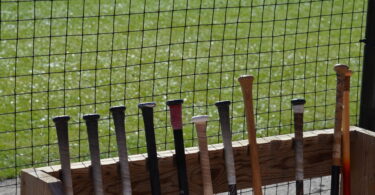Can you believe summer ball is already over? Even though it feels like everything is coming to an end right now, we both know that fall ball will be here before you know it. There is much to do between now and then, which is why it’s so important to stop and reflect now when everything from the summer is fresh in your mind. Just like after the high school season, we highly recommend doing another post-season review and self-evaluation for your summer season.
Not sure what we mean by post-season review and self-evaluation? No problem! We are here to help you review, assess, and learn from this summer’s trials and tribulations so you have direction for strengthening your game during fall ball, just follow along below!
If you did a self-evaluation after your high school season, we suggest you start there. If not, skip ahead and get started on your summer self-evaluation with Tip 1 below.
Reviewing your progress over the summer
Look back at your high school season review and self-evaluation. Were you able to successfully address your weaknesses during the summer? Why or why not? Did you meet your goals? What are your new strengths and weaknesses? Look back, assess how you did, use the feedback to build an even better plan moving forward with your new summer season self-evaluation. Follow the same steps below to create the latest chapter in your path to college baseball, you won’t regret it. Each new self-evaluation lets you track and map out your improvement. If you forget what to do, just follow the steps below!
Tip 1: Write everything down
A D1 College World Series head coach once told me, “Write everything down. Don’t trust your memory!” When it comes to self-evaluation, this may be the most helpful tip. Seasons, mistakes, and successes are easily forgotten. If you don’t have a baseball journal, let this review be your first entry. You won’t be sorry. Being able to refer to what you were doing when things were going well or poorly can be a great tool. For more, check out our article on how to use a journal or video for your improvement.
Tip 2: Honesty Matters!
The truth might hurt for a little bit, but sugar-coating will hurt your chances for improving as a player long-term. You need to be brutally honest with yourself when assessing your season and abilities. It will be hard, but it will pay off!
Tip 3: Devote More Time to Constructive-Criticism than Praise
It is human nature to want to devote more time to positive things than negative things, but singing your own praises is only helpful moving forward if you look at the reasons why you were successful, and use that as a road map for preparing for future success. You should definitely take time to do this! At the same time, you should spend as much time, if not more, on what didn’t go well. Put your focus into concrete ways to improve these weaknesses. The best and hungriest players attack their weaknesses and spend more time on turning them into strengths, even though to others it might look bad. The complacent and satisfied player continues to work on their strengths because that’s what makes them look good to others. Create a road map for improvement with concrete goals. Our articles (Part 1and 2) on making goals the right way may be of great use.
Tip 4: Seek Outside Opinions
After you have evaluated yourself and developed a plan for maintaining strengths and improving weaknesses, seek out the opinion of others. Cross-checking what you think about yourself will give you a more realistic perspective of where you stand. You may also hear new ideas about your skills that you missed. It’s important to get a variety of opinions (teammates, coaches, scouts, etc.), but you need to make sure the people you ask will give you an honest evaluation. Try to get the opinion of people who know college baseball well and can help you improve your game for the next level.
Tip 5: Create an Action Plan
Taking the time to review and assess your season is great, but the value of the process only goes as far as the change it creates. You need to evaluate, assess, but most importantly use the information you learn to create an action plan for future success. How will you address your weaknesses? How will you continue to improve your strengths? Create a plan for future success and you will be one step closer to playing college baseball!







